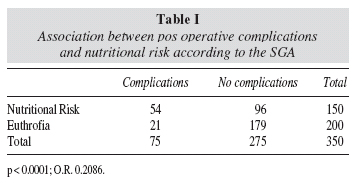Meu SciELO
Serviços Personalizados
Journal
Artigo
Indicadores
-
 Citado por SciELO
Citado por SciELO -
 Acessos
Acessos
Links relacionados
-
 Citado por Google
Citado por Google -
 Similares em
SciELO
Similares em
SciELO -
 Similares em Google
Similares em Google
Compartilhar
Nutrición Hospitalaria
versão On-line ISSN 1699-5198versão impressa ISSN 0212-1611
Nutr. Hosp. vol.23 no.6 Madrid Nov./Dez. 2008
Nutritional diagnosis obtained by subjective global assessment in surgical patients and ocurrence of post operative complications
Diagnóstico nutricional obtenido mediante valoración global subjetiva en pacientes quirúrgicas y aparición de complicaciones posoperatorias
Malnutrition is an independent factor for the increase of morbidity and mortality. In this context, surgical population needs a special attention because surgery amplifies pre-existing malnutrition, leading to an increased risk of complications.1 Nutritional assessment can help to identify these patients and prevent post-operative complications. By the way, a gold standard has not been found. So, our objective was to validate the Subjective Global Assessment Protocol (SGA) as a reliable method for detecting malnourished surgical patients.
We evaluated adult patients hospitalized at surgery clinic of Gaffrée e Guinle's University Hospital. The SGA protocol2 and the Anthropometric Assessment3 were done by the same well-trained appraiser at the moment of hospitalization or, at least, three days after. After nutritional assessment, patients were divided in 2 groups (patients with and without nutritional risk by SGA protocol) and followed for post operative complications.
From August/2002 to March/2005, 350 patients (mean age of 54.07 ± 15.73 years) were assessed, 134 with cancer diagnosis. 42.86% of the admitted patients had nutritional risk at admission, being 28% of these with severe malnutrition risk according to SGA. In general, these patients had lower mean values of arm circumference, triciptal skin fold and body mass index when compared with euthrofic ones (p < 0.0001), showing that SGA had convergent validity with anthropometric parameters. Indeed, 54 of the 75 patients who had some type of post operative complication were malnourished according to SGA (p < 0.0001, table I). This result was extremely significant, showing that SGA had prognostic value for nutrition-related complications. Not least, twenty of the 24 deaths registered had nutritional risk according to SGA.
These results bring us to a discussion still present in nutritional assessment. There is some reluctance in accept SGA as a diagnostic method because it has a different concept of malnutrition. To the objective methods, malnutrition is characterized by alterations at body compartments, at somatic or visceral protein reserves, for example.4 Malnutrition concept applied in SGA goes far beyond these alterations, considering clinical history e physical examination of the patient, which lead to believe that the diagnosis given by SGA is only a marker of "health status".5
In our study, SGA proved to be of great prognostic value in surgical patients and can be used as a good method for nutritional assessment in this population. Nevertheless, cancer is a determinant factor of morbimortality in this population.
B. D'Alegría1, C. Cohen1, F. Medeiros2 and P. E. Portari Filho2
1Nutritionist. Member of Nutritional Therapy Commission. Gaffrée e Guinle Hospital. University of Rio de Janeiro.
2Assistant Professor of the Nutrition School of the University of Rio de Janeiro and member of Nutritional Therapy Commission.
Gaffrée e Guinle Hospital. University of Rio de Janeiro. Brasil.
References
1. Detsky AS et al. Predicting nutrition-associated complications for patients undergoing gastrointestinal surgery. JPEN J Parenter Enteral Nutr 1987; 11(5):440-6. [ Links ]
2. Detsky AS et al. What is subjective global assessment of nutritional status? JPEN J Parenter Enteral Nutr 1987; 11(1): 8-13. [ Links ]
3. WHO (World Health Organization) Physical Status: the use and interpretation of anthropometry. World Health Organization (Technical Report Series, Editor. 1995: Geneva. pp. 375-411. [ Links ]
4. Barbosa-Silva MC, AJ de Barros. [Subjective nutrition assessment: Part 1 - A review of its validity after two decades of use]. Arq Gastroenterol 2002; 39(3):181-7. [ Links ]
5. Detsky AS. Nutritional status assessment: does it improve diagnostic or prognostic Information? Nutrition 1991; 7(1):37-38. [ Links ]
![]() Correspondence:
Correspondence:
Fernanda Medeiros.
Rua Marquês de Abrantes 197/304.
RJ-Brasil-CEP-22230-060.
E-mail: medeiros.fernanda@gmail.com
Recibido: 19-V-2008.
Aceptado: 14-VIII-2008.















